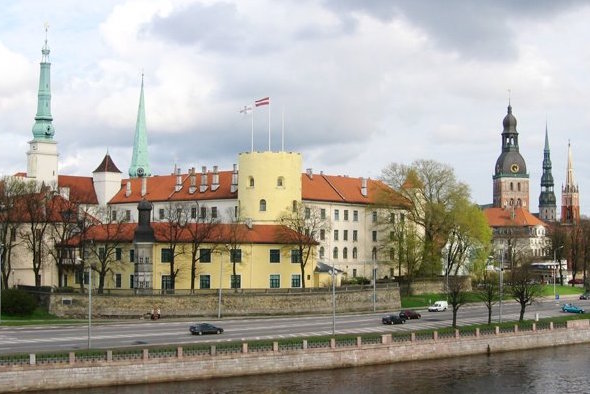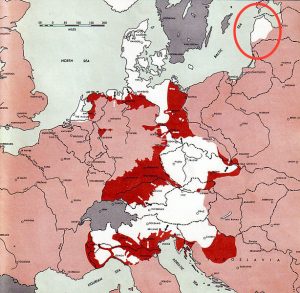
Churchill and the Baltic States: From WW2 to Liberation
EXCERPT ONLY: For the complete text of “Churchill and the Baltic” with endnotes, please go to this page on the Hillsdale College Churchill Project.
“No doubt where the right lay”: 1940-95
Soviet Ambassador Ivan Maisky was a “Bollinger Bolshevik” who mixed support for Communism with a love of Western luxury. Friendly to Churchill, he knew the Englishman hoped to separate Hitler and Stalin, even after World War II had started.
But Maisky tended to see what he wished to see. In December he recorded: “The British Government announces its readiness to recognize ‘de facto’ the changes in the Baltics so as to settle ‘de jure’ the whole issue later, probably after the war.” There was no such announcement.
“The Russian danger…”
Germany invaded the Soviet Union on 22 June 1941. Churchill broadcast: “the Russian danger is therefore our danger.” Why then not recognize the Soviet occupation of Latvia, Lithuania and Estonia? The question came now, not only from soft-liners like Cripps and Halifax, but from close Churchill associates like Eden and Beaverbrook. But de jure recognition was one thing Stalin would never get get.
When Eden, now foreign minister, visited Moscow in December 1941, he implored Churchill to modify his stance. It was Eden’s first major foreign policy assignment. Temperament, ambition, anxiety for victory impelled him. American opinion influenced Churchill too, and the USA at that time remained opposed to recognizing a Soviet Baltic.
While Eden was in Moscow, Churchill was in America. Eden urged him and Roosevelt to recognize immediately the Soviet Baltic. “Stark realism” demanded it. The Anglo-Americans could not stop the Russians from getting their way.
Churchill still demurred. The 1941 Soviet conquests, he replied,
were acquired by acts of aggression in shameful collusion with Hitler. The transfer of the peoples of the Baltic States to Soviet Russia against their will would be contrary to all the principles for which we are fighting this war and would dishonour our cause….there must be no mistake about the opinion of any British Government of which I am the head, namely, that it adheres to those principles of freedom and democracy set forth in the Atlantic Charter.
“The Ireland of Russia”
In February 1942 the War Cabinet discussed alternatives to outright recognition. Eden proposed agreeing to Russia’s Baltic military bases. Halifax proposed quasi-independence, with Russian control of Latvian, Estonian and Lithuanian defense and foreign policy. Churchill opposed both. In Washington, Halifax mentioned recognition to Roosevelt. The President was interested, but Undersecretary of State Sumner Welles told FDR it would epitomize “the worst phase of the spirit of Munich.” In another thrust, Beaverbrook asked: “How can it be argued now that territory occupied then by the Russians—Lithuania, Latvia and Estonia—is not the native soil of the Russians?” Lithuanians, Latvians and Estonians could offer some arguments.
The pressure of events wore on the Prime Minister. The Russians were holding down 185 German divisions on a thousand-mile front. On 7 March 1942, Churchill sent a feeler to Roosevelt:
The increasing gravity of the war has led me to feel that the principles of the Atlantic Charter ought not to be construed so as to deny Russia the frontiers she occupied when Germany attacked her. This was the basis on which Russia acceded to the Charter, and I expect that a severe process of liquidating hostile elements in the Baltic States, etc. was employed by the Russians when they took those regions at the beginning of the war.
* * *
Churchill’s suspicions were correct. Latvia’s President Karlis Ulmanis had been arrested and deported; he died in 1942. Konstantin Päts of Estonia spent years in prisons or “psychiatric hospitals,” finally dying in 1956. Lithuania’s Antanas Smetona, the first Baltic president to institute an authoritarian regime (1926), fled, ultimately to the USA, where he died in 1944. From June 1940, politicians, teachers and intelligentsia—anyone who seemed a threat to the Soviet rule—was deported.
On 8 April 1942, the War Cabinet approved British recognition of the 1941 Soviet borders. But now Roosevelt objected. The United States, he said through Secretary of State Hull, “would not remain silent if territorial clauses were included in the [Anglo-Soviet] treaty.” Eden conveyed this to Soviet Foreign Minister Molotov who, surprisingly, accepted. Thus it was that American, not British diplomacy that forestalled de jure recognition of the Soviet Baltic in 1942. But Martin Gilbert maintained that this was actually “to Churchill’s relief.” Alexander Cadogan, a Foreign Office official who shared Churchill’s views on the Baltic, wrote, “We must remember that [recognition] is a bad thing. We oughtn’t to do it, and I shan’t be sorry if we don’t.”
Baltic “Ostland”
There matters rested while the Germans, first hailed as liberators, conducted another violent ethnic clensing. Over 300,000 Latvians, Lithuanians and Estonians—one out of ten—were executed. They slaughtered Jews in hastily-built death camps. The Gestapo and a few quislilngs ruled the Nazi colony “Ostland.” With the Red Army’s return in 1944 came a third holocaust. An Estonian remembered: “The Germans were brutal, the Russians worse.” Clearances of Baltic citizens continued under Stalin’s successors. Ethnic Russians moved in while natives were shuttled out. To this day, native Latvians form barely a majority in their country.
At the Teheran conference in late 1943, Roosevelt abandoned his non-recognition policy—but not openly. With remarkable cynicism, he explained to Stalin that he did not wish to lose the votes of the six or seven million Polish-Americans, or of the smaller, though not negligible, number of voters of Lithuanian, Latvian and Estonian origin.
How easily Roosevelt surrendered the liberties he had so strongly defended a year earlier. “Moral postures in the harsh world of power politics may acquire a certain nobility in their very futility,” wrote David Kirby. “But when tainted by a history of compromise and failed bargains, they tend to appear somewhat shabby.”
* * *
But Teheran also left Churchill with a softer attitude toward Stalin. His feelings had changed, he wrote Eden, tempered by hard reality on the ground:
The tremendous victories of the Russian armies, the deep-seated changes which have taken place in the character of the Russian State and Government, the new confidence which has grown in our hearts towards Stalin—these have all had their effect. Most of all is the fact that the Russians may very soon be in physical possession of these territories, and it is absolutely certain that we should never attempt to turn them out.
Churchill was a politician depending on the support of a majority, and no politician could remain blind to that reality. But in judging Churchill, must consider his complete record. And for him, the subject remained.
To his War Cabinet in late January Churchill said the “ideal position would be to postpone any decision about frontiers until after the war, and then to consider all frontier questions together.” Nevertheless, the Red Army was “advancing into Poland.” Churchill knew he was caught in a shocking compromise of proclaimed principle. What were they to say to Parliament and the nation, he asked Eden, about the idealistic principles declared in the Atlantic Charter?
The March of Fate

As the Red Army swarmed west in 1944, surviving Balts had the unpalatable choice of siding with one barbarian or the other. More fought with the Germans than the Russians. Stalin expended half a million men vainly trying to storm the “Courland Pocket,” declaring that the imperialist West would try to prevent reestablishment of Soviet authority. But the West had no such intentions. Instead, Balts faced tanks bearing American white stars. They were U.S. Shermans, thrown into battle without their new red stars. But the Baltic fighters gave up only with the German surrender.
In 1950, Churchill sadly summarized the tragedy of the Baltic States:
Hitler had cast them away like pawns in 1939. There had been a severe Russian and Communist purge. All the dominant personalities had been liquidated in one way or another. The life of these strong peoples was henceforward underground. Presently Hitler came back with a Nazi counter-purge. Finally, in the general victory the Soviets had control again. Thus the deadly comb ran back and forth, and back again, through Estonia, Latvia and Lithuania. There was no doubt however where the right lay. The Baltic States should be sovereign independent peoples.
In the end, the United States, along with Britain, Australia, Canada and a few other countries, never recognized the Soviet annexation of Estonia, Latvia and Lithuania. Baltic gold remained safe in London, and their embassies continued to function. But Balts fortunate enough to escape, and their children, have long memories. They did not look kindly on Roosevelt, nor, one has to say, on Churchill.
What we can learn
It is useful to study Churchill and the Baltic for what it can teach us today about powerful aggressors and the fate of small nations. In wartime negotiations, the Soviets were consistent. They made the most extreme demands, offering little in exchange. Meet their demands and more followed. Whenever the other side said they would not agree, an eleventh-hour shift by Moscow would result. Even this was not a defeat, since the democracies were often so grateful for evidence of good will that they would struggle to meet the next round of Soviet demands. The perceptive Churchill once told Eden, “do not be disappointed if you are not able to bring home a joint public declaration.”
Churchill frequently repeated the Boer expression, “All will come right.” By 1992, when I made my first visit, the Baltic was free. In 1995 with three friends, I bicycled the Latvian coast from Lithuania to Estonia, and presented a Latvian translation of Churchill’s The Dream to President Guntis Ulmanis.
The British ambassador had arranged for us to meet local officials along the way. I will never forget the words of Teodors Eniņš, Mayor of Liepaja. He raised the question of why the Anglo-Americans hadn’t fought Russia to free Eastern Europe in 1945. We said the American and British public would have never countenanced it. “You should have done it anyway,” Mayor Eniņš replied. “Think of how much trouble you would have saved yourselves—not to mention us.”







One thought on “Churchill and the Baltic States: From WW2 to Liberation”
A longtime colleague has written me thus: “You let the Mayor’s ringing comment stand as your sign off, suggesting you agree. I found it the kind of emotional chest-thumping that misdirects our understanding of history. Just what ‘trouble’ would have been avoided? More important, what trouble would have been created? Dreams about the future are to be encouraged. They can open new paths. I’m less convinced of the value of counter-factual history.”
___________________________________
The “trouble” Mayor Eniņš referred to was fifty years of communism. But no—as I wrote, we argued with him, saying the Americans and British would have never stood for a preventive war with Russia in 1945. He wasn’t buying it. A brief addendum:
The Mayor met us for breakfast that day with the rain pouring down and nobody wanted to ride, so it was a leisurely chat. He recalled that as kids, he and his pals would often sneak down to the beaches at night. The Soviets had barb-wired the Baltic coast from end to end, with armed guards patrolling. Eniņš and his friends would slip through the wire and repeatedly walk backwards to the sea, and then forwards, their footprints making the beach guards think there had been an mini-invasion. (One of my friends quipped, “Amber waves of Danes.”)
We laughed about this until the Mayor suddenly pulled up his shirt and showed us the scars where they strafed him one night when he let the guards get too close. A slightly better shot and there would have been no Teodors Eniņš.
The moral I took away from that meeting was: How you think and dream depends a lot on when and where you grew up.
Comments are closed.